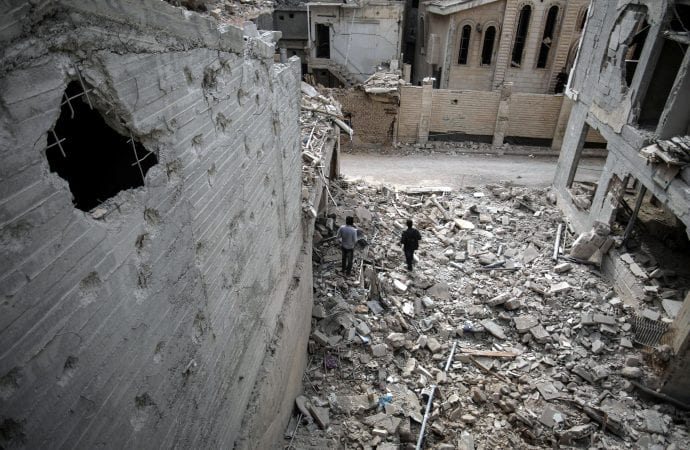According to a new poll, an increasing number of Catholics believe anti-Christian persecution is a “very severe” global concern.
Results from an annual survey conducted by the papal charity Aid to the Church in Need USA released this week reveal that 46 percent of U.S. Catholics believe the issue to be a severe concern, up from only 30 percent last year. The survey also found that 58 percent of Catholics identify as “very concerned” about the plight of Christians around the globe, also up from 41 percent last year.
Yet despite the general increase in awareness and concern, the same data reveal that most U.S. Catholics believe that attention to the issue is lacking on both the local level and national levels of the U.S. Church.
Of the 1,000 respondents surveyed by McLaughlin & Associates, only 19 percent believe that their local parish is “very involved” on the issue, a drop of 18 percent from last year’s data. Another 22 percent said they were “unsure” as to the Church’s involvement.
On the other end of the spectrum, only 24 percent of respondents believe that their bishop is “very engaged” on the topic, down 8 percent from last year. Another 14 percent said that their bishop is “not engaged at all.”
Meanwhile, Pope Francis received high marks for his involvement, with a majority (51 percent) of respondents saying they believe he is “very engaged” with the issue, while only 14 percent said they were “unsure” of the pope’s involvement.
Coincidently, the pope’s selected prayer intention for the month of March this year is dedicated to new Christian martyrs.
“It might be hard for us to believe, but there are more martyrs today than in the first centuries,” Francis observed in the March edition of “The Pope Video.”
While those surveyed believed Christian persecution is an area of severe concern, other global issues ranked ahead of it.
Among other concerns, 82 percent of respondents said that human trafficking is most important, with 74 percent ranking poverty as a top priority, and 60 percent identifying the global refugee crisis as the number one concern. Climate change clocked in just under the issue of Christian persecution at 57 percent.
In response to the survey findings, Aid to the Church in Need’s chairman said “It is heartening to see that U.S. Catholics have a growing awareness of and concern about the persecution of Christians.”
“It is telling that human trafficking, poverty and the refugee crisis get more attention from U.S. Catholics than the persecution of Christians,” he added. “The rise of ISIS and other jihadist groups in Iraq and Syria ripped apart the fabric of ancient Christian communities. Yet, our survey shows that even after eight years of a brutal war and terror in the region, U.S. Catholics are still not fully aware of the magnitude of the suffering of Christians targeted with brutal repression and even genocide.”
Those surveyed were also asked to identify the country they believe Christians to be most persecuted and the majority chose Iran. Other countries listed as worst offenders were Iraq, Syria, China, North Korea, Pakistan and Saudi Arabia.
When asked to identify the source of global conflict, 75 percent of respondents said that politics is the root cause, with 66 percent choosing ethnic tensions, and 60 percent identifying religion.
A majority of respondents said the United States should aid victims of anti-Christian persecution through diplomatic pressure, economic sanctions, and offering emergency asylum.
According to data from Aid to the Church in Need, the right of religious freedom is gravely threatened in 38 countries around the globe, and according to a 2018 report by Open Doors USA, there are more than 215 million Christians persecuted worldwide, and one in 12 live in countries where Christianity is “illegal, forbidden, or punished.”
In response to the latest data, Marlin urged Catholics to invest in new efforts to raise awareness of this issue, both at the parish and diocesan level.
“There is a need to better inform and galvanize the faithful,” he said. “There is an obligation to keep the spotlight on the seriousness and pervasiveness of Christian communities being persecuted around the world.”

